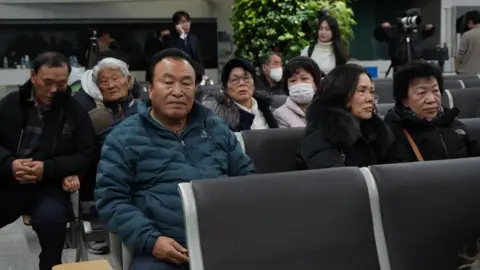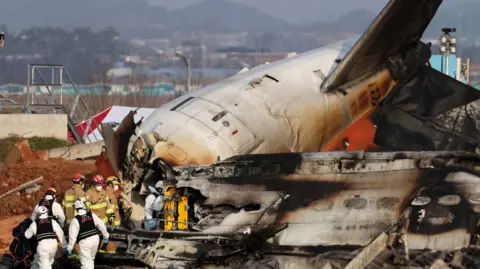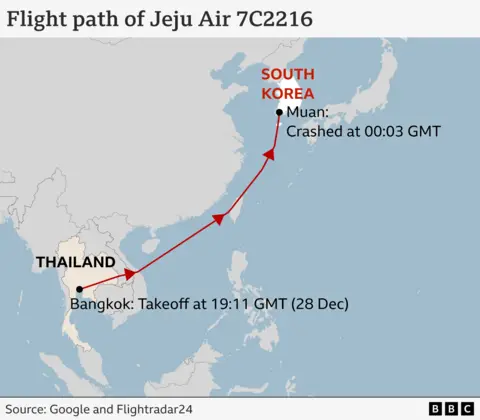South Korea plane crash kills 179 with investigation into cause under way
All passengers and most of the crew onboard a Jeju Air flight have died after the plane crash-landed at an airport in South Korea on Sunday.
A total of 179 of the 181 people travelling on the Boeing 737-800 were killed, with just two survivors - both cabin staff - pulled from the burning wreckage.
The plane landed at Muan International Airport in the country's south, skidding off the runway and crashing into a wall in a fiery explosion.
Flight 2216 had been returning from Bangkok, Thailand with six crew and 175 passengers, many of them holidaymakers.
An investigation into the cause is under way - with experts and officials pointing to a number of possible factors.

Distraught families gathered in the airport's arrival hall in tears, as they waited for bodies to be identified.
Some of those killed have been identified only by their fingerprints.
Maeng Gi-su, 78, told the BBC his nephew and his nephew's two sons had been on the plane.
It was the family's first trip abroad, to mark the youngest son finishing his college entrance exams.
"I can't believe the entire family has just disappeared," he said. "My heart aches so much."
The passengers included 173 South Koreans and two Thai nationals. They were aged between three and 78, although most were in their 40s, 50s and 60s, South Korea's Yonhap news agency reported.
Jongluk Doungmanee, 49, had been returning to South Korea from visiting family in Thailand. The mother-of-two lived in South Korea with her husband and worked in agriculture.
In an interview with BBC Thai, her cousin Pornphichaya Chalermsin said she had "only ever seen such news from other countries and never thought it would involve Thai people", adding: "Watching the video footage made me feel even more distressed."
Footage of the crash - which happened shortly after 09:00 local time (00:00 GMT) - showed the aircraft landing without wheels, overshooting the runway and crashing into the airport's perimeter wall, before it exploded into flames.
South Korean transport officials said the plane ran into difficulties approaching landing - with the pilot, who had more than 6,800 hours of flight experience, pulling out of the first attempt due to bird interference.
Soon after, the pilot issued a mayday call and was allowed to land in the opposite direction to usual.
Officials have suggested a bird strike and bad weather may have played a role but aviation experts have questioned whether these were enough to cause such a deadly crash.
 EPA
EPAOne passenger sent a relative a message saying a bird was stuck in the wing, according to the South Korean News1 agency - but officials have not yet confirmed whether the plane was hit by birds.
Geoffrey Thomas, editor of Airline News, told the BBC "a lot of things about this tragedy don't make sense".
He said South Korea and its airlines were considered "industry best practice" and that both the aircraft and the airline have an "excellent safety record".
"At this point there are a lot more questions than we have answers," Gregory Alegi, an aviation journalist and former teacher at Italy's air force academy, told the Reuters news agency.
"Why was the plane going so fast? Why were the flaps not open? Why was the landing gear not down?"
The disaster is a national tragedy for South Korea, which has been embroiled in a political crisis after President Yoon Suk Yeol and his temporary successor were both impeached by parliament.
Acting President Choi Sang-mok, who was only appointed on Friday, visited the site of the crash on Sunday.
"I express my deepest condolences to the many victims in the incident. I will do all I can for the injured to quickly recover," he said.
The Jeju Air crash is the worst for any South Korean airline since the 1997 Korean Air crash in Guam, which killed more than 200 people. Prior to Sunday, the deadliest on South Korean soil was an Air China crash flight that killed 129.
The Muan airport crash also marks the first fatal accident for Jeju Air, one of South Korea's largest low-cost airlines, which was set up in 2005.
Jeju Air bosses bowed deeply as they gave a public apology at a press conference on Sunday.
"We deeply apologise to all those affected by the incident. We will make every effort to resolve the situation," the firm said in a statement.
Boeing, which manufactured the 737-800 jet, has said it was in touch with the airline.

